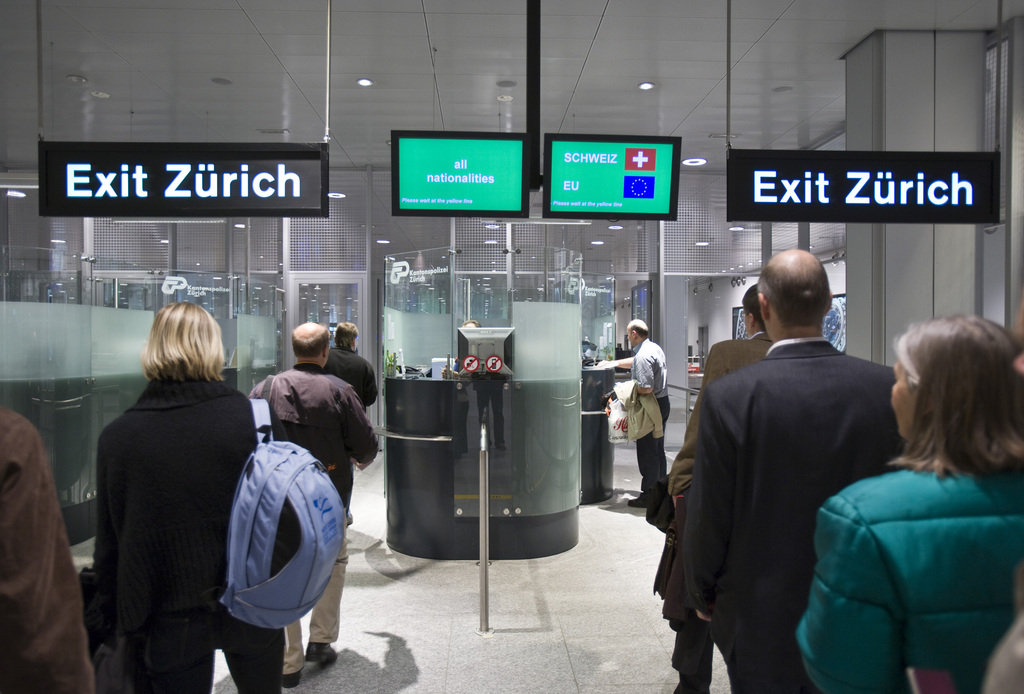‘In Switzerland immigration doesn’t only create winners’

Swiss authorities will need to use more than just economic arguments if they are to convince a majority of voters next February to keep borders open with the EU, says one migration expert.
Three nationwide votes on immigration policy are set to fuel political debates between now and the next parliamentary elections in 2015. They include a referendum on extending the free movement of persons to Croatia and the Ecopop initiative to “stop over-population”.
But first, Swiss voters will decide on February 9 whether to accept an initiative by the right-wing Swiss People’s Party calling for the re-introduction of immigration quotas and re-negotiating agreements on the free movement of persons with the European Union.
Etienne Piguet, a professor at the University of Neuchâtel and vice-president of the Federal Commission on Migration, tells swissinfo.ch that reinstating quotas would have little real impact. After all, economic considerations have historically been the main drivers of Swiss migration policy.
swissinfo.ch: How do you explain this current wave of votes on immigration?
Etienne Piguet: Since the 1960s immigration has been part of the public debate in cyclical phases. In the Swiss system of direct democracy, this means regular nationwide votes on the issue. It’s also worth pointing out that the proportion of the immigrant population is much higher in Switzerland than in other European countries, which explains why these proposals resonate.
swissinfo.ch: Is this current phase comparable to the 1970s, when there were the so-called Schwarzenbach initiatives against foreign overpopulation?
E.P.:Yes, absolutely. At that time there was also a series of votes that created a lot of tension among the population. Just like the People’s Party initiative “against mass immigration”, the Schwarzenbach initiatives didn’t take into account the negative consequences for the economy. But I do see a difference: 40 years ago asylum policy wasn’t an issue, whereas today it features clearly in the backdrop of all these proposals.
swissinfo.ch: If the People’s Party initiative is accepted on February 9, will Swiss migration policy change radically?
E.P.:Relations with the European Union would be affected more than immigration policy would. In fact we shouldn’t overestimate the consequences of a re-introduction of quotas: migration is not simply going to stop from one day to the next. We have seen in the past that quotas can be rather inflexible and bureaucratic.
The People’s Party initiative is proposing quotas for diverse categories like refugees, asylum-seekers, low-skilled workers and the highly skilled. A sharp increase in any one of those categories would have to be compensated for by a decrease in another category – and that would create serious problems for businesses.
Following the Revocation of the Edict of Nantes in 1685, banning Protestant worship in France, tens of thousands of French Huguenots – Protestant refugees – came to Switzerland. It was the first wave of immigration that the country experienced.
After that, up to the 1890s, immigration – unlike emigration – was not a major factor in the evolution of the population.
Between 1888 and 1910, more than 260,000 people immigrated to Switzerland, replacing workers who left the country in the second half of the 19th century.
During the two world wars and the depression of the 1930s, immigration slowed to a trickle.
Most of the immigrants in that period were Swiss people returning home.
The post-war economic boom created a huge demand for manual labour. Between 1951 and 1970, Switzerland experienced its biggest wave of immigration with the arrival of nearly 2.7 million foreigners.
The recession of 1974-1976 brought an end to this long phase of post-war immigration.
Immigration then fluctuated on the basis of economic circumstances up to the 2000s.
Since June 1, 2002, when the free movement of persons accord came into effect, the immigrant population has increased by nearly a quarter (roughly 393,000 people).
At the end of 2012 there were 1.87 million foreigners in Switzerland, the equivalent of nearly 23.3% of a total population that has passed the 8-million mark. In addition, more than 270,000 cross-border workers hold a job in Switzerland.
Sources: Historical Dictionary of Switzerland, Federal Office for Statistics
swissinfo.ch: Since 2000, those who are in favour of the free movement of persons have managed to get voters on their side on three occasions by highlighting the benefits for Swiss prosperity. Is that line of argument valid today?
E.P.:The economic argument will once again play an important role when it comes time to vote, but it won’t be enough on its own. A growing number of people no longer understand the end goal of an immigration policy that tries to feed the economy just so it can recruit more migrants. The authorities have to broaden their message to include social issues and more long-term objectives.
But I should point out that the anti-immigration rhetoric, which tends to resonate with people in their daily lives, has a hard time actually winning votes. The majority of people have always accepted a certain degree of openness, especially when it comes to the free movement of people. Even though the People’s Party has undeniably had an influence on migration policy in recent years, particularly with regard to asylum, in the end the public vote has always come out in favour of the government’s position – that is, of compromise.
swissinfo.ch: Haven’t the authorities underestimated the negative consequences of immigration, and of free movement in particular: wage dumping, pressures on infrastructure, an overheated real estate market and rent increases?
E.P.:The benefits of immigration continue to outweigh the costs for Switzerland as a whole. But immigration doesn’t only create winners. It’s of course interesting for the economy to be able to have a large qualified labour force and a more competitive job market. But obviously someone who can’t land a job in one of the border regions won’t see it that way. Clearly there’s been poor policy planning in terms of compensating for the social costs. The authorities have to acknowledge that there are losers in all of this and take better care of them.
swissinfo.ch: At the end of 2012, 23.2% of the Swiss population were foreigners. That’s the highest percentage in Europe, if you don’t count the tiny state of Luxembourg. Hasn’t Switzerland lost control of its immigration policy?
E.P.:Immigration numbers would be even higher if rules didn’t exist. Many Swiss people are under the impression that migration policy has been liberalised on all fronts, when in fact the rules are actually very strict for non-European immigration. Clearly we have a two-tier system.
Switzerland’s extraordinary prosperity explains why there has been such a large influx of European workers and a migration imbalance in this country compared to Europe. But it’s highly likely that if Swiss negotiators had known what would happen in the future, they would have proposed additional restraints on movement before signing those first accords with the EU.
swissinfo.ch: What would Switzerland be like without the free movement of persons?
E.P.:I don’t think it would look all that different. Maybe migration from the EU would be 20 to 30% less than what it is now. History has shown that when the Swiss economy needs foreign workers, it manages to get them one way or another. If we didn’t have free movement, then we would certainly have fairly high quotas for EU workers.
swissinfo.ch: Switzerland has long been considered a model for integrating migrants through work. Is that still the case today?
E.P.:Yes, it is, but to a lesser extent than in the past. In the 1960s the many migrants who came, especially those from Italy, were able to get everything they needed from their place of work: their professional skills, but also the ability to use one of the official languages and to make friends. The migrants who couldn’t do that or who lost their job had little choice but to go back to their country of origin. This integration through work doesn’t exist anymore because a person who suddenly becomes jobless doesn’t have to leave the country right away.
Besides, the official discourse says implicitly that Switzerland attracts only the highly skilled. But in reality the economy also needs low-skilled workers. These migrants present a challenge for integration, because some of them don’t have the tools to hold down a long-term job. The same is true for asylum-seekers and refugees and their families.
As far as highly skilled immigration goes, there is a risk in Switzerland that a type of transnational elite will come to settle and live in isolation. Let’s not forget that this too can create problems for integration.
On February 9, Swiss voters will have their say on an initiative of the right-wing Swiss People’s Party called “Against Mass Immigration”.
The initiative calls for the re-introduction of quotas for foreigners, cross-border workers and asylum-seekers.
Two more public votes on immigration will take place before the next federal parliamentary elections in 2015. One will be on the question of whether to extend the free movement of persons to Croatia, which joined the European Union on July 1, 2013. Parliament will debate the issue next year, and the People’s Party has already announced it will launch a referendum.
The other vote will be on an initiative of the environmentalist group Ecopop that aims to protect the environment and natural resources by limiting immigration to 0.2% of annual population growth.
Parliament will also be debating the initiative in the new year, ahead of the public vote.
Translated by Geraldine Wong Sak Hoi

In compliance with the JTI standards
More: SWI swissinfo.ch certified by the Journalism Trust Initiative












You can find an overview of ongoing debates with our journalists here . Please join us!
If you want to start a conversation about a topic raised in this article or want to report factual errors, email us at english@swissinfo.ch.